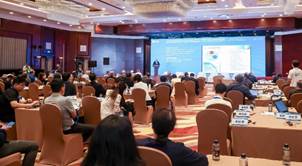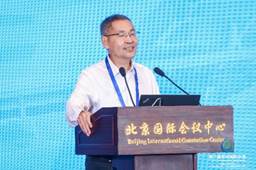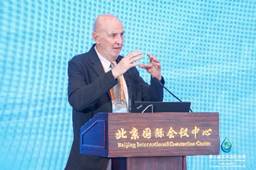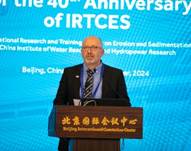On the morning of September 23, the "UNESCO Water Family
Symposium I: Sediment and Soil Erosion Solutions" was successfully held in
Beijing, jointly organized by IRTCES and IWHR. The theme of the meeting was
"Sustainable Use and Management of Land and Water Resources."
Academician Shao Ming'an from the Chinese Academy of Sciences and Academician
Slobodan Simonovic from the Royal Society of Canada and the University of
Western Ontario delivered keynote speeches. The meeting was chaired by
Professor Wang Zhaoyin, former President of WASER, and Professor Michael
Maerker, Editor-in-Chief of the International Soil and Water Conservation
Research.
(i) Highlights
The keynote speeches were visionary. Shao Ming'an presented a
keynote speech titled "Spatial Distribution and Regulation of the Soil Dry
Layer on the Loess Plateau," analyzing how vegetation construction
exacerbates the contradiction between water supply and demand, leading to the
emergence of soil dry layers and their profound impact on ecosystem functions
and hydrological cycles. He elaborated on the causes, changes, and spatial
distribution characteristics of soil dry layers in the Loess Plateau, assessed
the soil moisture vegetation carrying capacity and spatial patterns, and
proposed technical means to alleviate soil dry layers, including density
regulation, conversion between forests and grasslands, community reconstruction,
and land-use conversion, as well as vegetation construction and ecological
restoration suggestions based on water conditions.
Simonovic delivered a keynote speech titled "Water Security and
Sustainable Development: Building a Resilient Future through Performance-Based
Approaches." He introduced the framework of performance-based water
resources management and its core objectives, emphasizing the importance of
enhancing the sustainability and resilience of water resources management in
the face of global change complexities and uncertainties. This approach not
only optimizes current management standards but also proactively considers
future changes and challenges, offering new perspectives and solutions for
water resources management.
During the expert discussion session, experts including Hyoseop Woo,
former Vice-President of the International Association for Hydro-Environment
Engineering and Research; Carmelo Dazzi, former President of the European
Society for Soil Conservation; Valentin Gerasimov, Professor at Moscow State
University; Shi Hongling from IRTCES; Tarik Benabdelouahab, Director of
Environment and Natural Resources at the National Institute of Agronomy of
Morocco; Seyed Hamidreza Sadeghi, Vice-President of WASWAC; and Chun Kiat Chang,
Deputy Director of IRTCES for River Engineering and Urban Drainage at the
University of Science and Technology Malaysia, engaged in in-depth exchanges on
the latest research findings in sediment management, soil erosion, flood
control, and ecological protection. They provided valuable suggestions for
promoting academic progress and technological cooperation in this field.
(ii) Achievements
(1) It publicized President Xi Jinping's ecological civilization
thought, introducing Chinese wisdom and solutions such as "Lucid waters
and lush mountains are invaluable assets" and the integrated governance of
mountains, rivers, forests, farmlands, lakes, grasslands, and deserts.
(2) From the policy and strategic level, it further recognized the
importance of interdisciplinary and cross-sector cooperation in addressing
erosion and sedimentation issues.
(3) It shared the latest research progress and technological trends
in the field of erosion and sedimentation.
|

|

|
|
UNESCO Water Family Seminar: Venue for Solutions to Sediment and
Soil Erosion
|
Expert Discussion Session on Solutions to Sediment and Soil
Erosion at the UNESCO Water Family Seminar
|
|

|

|
|
Keynote Speech by Academician Shao Ming'an of the Chinese
Academy of Sciences
|
Keynote Speech by Academician Slobodan P. Simonovi? of the Royal
Society of Canada and the Canadian Academy of Engineering
|
|

|

|

|
|
Prof. Zhaoyinwang, Former President of WASER, chaird the meeting
|
Professor Michael Maerker, Editor-in-Chief of the International
Soil and Water Conservation Research, chaired the meeting
|
Prof. Shi Hongling from IRTCES attended the panel discussion
|
|
|
|
|
(iii) Reflections and
Suggestions
(1) Strengthen research and technology development, increase
funding, encourage technological innovation, support interdisciplinary
research, and promote the application of new technologies and materials in
prevention and control efforts.
(2) Enhance the integrated management of erosion and sedimentation.
Given the complexity of these issues, comprehensive strategies involving
multiple disciplines and perspectives are needed.
(3) Expand
international cooperation and exchange, encourage and support international
joint research projects to address erosion and sedimentation problems.

